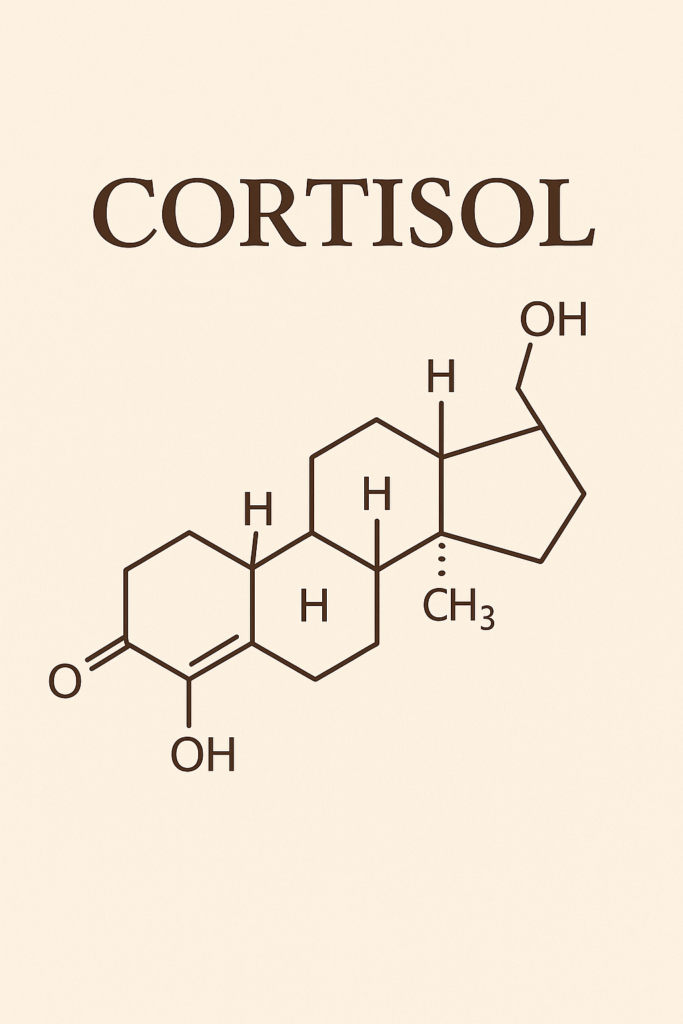
Menopause is often associated with declining estrogen and progesterone levels, hot flashes, and mood changes — but there’s another hormone playing a powerful behind-the-scenes role: cortisol.
Cortisol, commonly known as the stress hormone, is critical to understanding the deeper challenges of menopause. In this blog post, we’ll explore the role cortisol plays in the body, how it interacts with menopause, and what you can do to keep it balanced for better health and well-being.
What Is Cortisol?
Cortisol is a glucocorticoid hormone produced by the adrenal glands, which sit just above your kidneys. It plays a vital role in:
- Regulating metabolism
- Controlling inflammation
- Supporting the immune system
- Managing blood sugar levels
- Assisting with memory formulation
- Regulating the sleep-wake cycle
- Responding to stress
Cortisol production is governed by the hypothalamic-pituitary-adrenal (HPA) axis, which activates during stress and prepares your body for a “fight or flight” response.
In a healthy body, cortisol follows a diurnal rhythm: it’s highest in the morning to help you wake up and declines throughout the day, reaching its lowest at night.
Why Does Cortisol Matter in Menopause?
During menopause — especially perimenopause and postmenopause — your body undergoes significant hormonal shifts. Estrogen levels decline, and because estrogen normally helps regulate the stress response and the HPA axis, its reduction can lead to cortisol dysregulation.
The result?
A domino effect of symptoms that look like “just menopause,” but are actually cortisol-driven issues, including:
- Sleep disturbances
- Increased abdominal fat
- Anxiety and mood swings
- High blood pressure
- Lowered immunity
- Fatigue and brain fog
The Cortisol–Estrogen Connection
Estrogen plays a protective role against the negative effects of cortisol. When estrogen is high and stable (as in premenopausal years), the body is better equipped to manage stress. However, during menopause, declining estrogen may increase cortisol’s effects:
- Heightened Sensitivity to Stress: Women in menopause often report greater emotional reactivity or intolerance to stressors that were once manageable.
- Impaired Sleep: Cortisol is inversely related to melatonin. Elevated nighttime cortisol disrupts sleep, especially when hot flashes and night sweats are present.
- Fat Storage Changes: High cortisol promotes visceral fat storage (belly fat), which is already a risk during menopause due to slowed metabolism.
Symptoms of Cortisol Imbalance in Menopause
You might not immediately connect cortisol to your symptoms, but here are signs to look out for:
- Waking up tired despite sleeping 7–8 hours
- Feeling wired at night or “tired but wired”
- Midsection weight gain that’s hard to lose
- Sugar or salt cravings
- Easily startled or anxious
- Lightheadedness upon standing
- Inflammation and joint pain
- Brain fog and short-term memory issues
Cortisol Testing: Should You Do It?
If you suspect cortisol dysregulation, consult your healthcare provider about testing options. These include:
- Saliva cortisol testing (4-point test): Measures cortisol at four times over the day to show patterns.
- DUTCH test (Dried Urine Test for Comprehensive Hormones): Offers insight into cortisol metabolites and rhythms.
- Blood tests: Often measure cortisol at one point in time (usually morning), less helpful for rhythm evaluation.
How to Manage Cortisol Naturally During Menopause
Fortunately, there are science-backed strategies to regulate cortisol and ease menopausal symptoms:
1.
Prioritize Sleep Hygiene
- Go to bed and wake up at the same time daily.
- Limit blue light exposure 1–2 hours before bed.
- Keep your bedroom cool and dark.
- Consider magnesium glycinate or L-theanine (consult your doctor).
2.
Use Stress Reduction Techniques
- Deep breathing (box breathing, 4-7-8 method)
- Meditation and mindfulness: Just 10–15 minutes daily lowers cortisol levels.
- Journaling and gratitude practices
- Gentle movement: Tai chi, restorative yoga, and walking
3.
Adapt Your Exercise Routine
- Avoid over-exercising, which can increase cortisol.
- Combine strength training (2–3x/week) with moderate cardio.
- Include low-impact activities like pilates and yoga.
4.
Balance Blood Sugar
- Eat balanced meals with protein, fat, and fiber.
- Avoid skipping meals.
- Limit refined sugars and highly processed foods, which spike insulin and cortisol.
5.
Try Adaptogens (with caution)
- Ashwagandha: Known to lower cortisol and support adrenal health
- Rhodiola rosea: May improve energy and reduce fatigue
- Holy basil (Tulsi): Supports mood and immune health
Always check with a healthcare professional before adding supplements.
6.
Reduce Caffeine and Alcohol
Both can stimulate cortisol production and interfere with sleep — already a challenge during menopause.
Cortisol and Menopausal Depression & Anxiety
Increased cortisol is linked to lower serotonin and dopamine levels — key neurotransmitters involved in mood regulation. This connection partly explains why many menopausal women experience:
- Irritability
- Anxiety
- Depressive episodes
Managing cortisol can therefore significantly improve mental well-being during menopause, especially when paired with therapy or medications when needed.
Final Thoughts: Cortisol Isn’t the Enemy—But It Needs Balance
Cortisol is essential to life. But in the context of menopause, when other hormones are declining, its effects become exaggerated. The key isn’t to eliminate cortisol — it’s to manage and restore balance.
Understanding your cortisol patterns and supporting your adrenal system can drastically improve how you experience menopause — not just physically, but emotionally and mentally as well.
Resources & Support
If you’re experiencing signs of cortisol imbalance during menopause, you are not alone. Menopause Matter offers educational tools, community support, and expert connections to help you navigate this transition with grace, knowledge, and empowerment.
Contact us:
info@menopausematter.org
1-800-576-9651